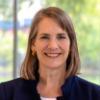Will There Be Learning in Heaven?
 Denise Daniels, Ph.D., Hudson T. Harrison Professor of Entrepreneurship
Denise Daniels, Ph.D., Hudson T. Harrison Professor of Entrepreneurship
In my capstone business/economics class this semester the students read together scripture passages from Isaiah, Ezekiel, and Revelation that provide a vision for the new heavens and new earth at the end of the age. We were exploring the question of what work might look like in heaven. A few weeks later in class I commented in an offhand way that I thought heaven would consist of open vistas of time allowing me to read whatever I wanted for as long as I wanted. Several of my students seemed horrified by the thought. They quickly reminded me that we’d read about God’s presence providing light, a river flowing from the throne through the city, trees bearing fruit in all seasons, and ongoing worship of God by people from every tribe and tongue – but not books in the New Jerusalem.
It was with this in my recent memory that I attended this year’s CACE seminar on “Polarization and the University Classroom.” Here I was struck by the question of whether or not there would be intellectual diversity in heaven. We had been talking about polarizing topics and how we might encourage thoughtful and civil engagement on these topics – everything from political perspectives, religious beliefs, LGBTQ+ issues, immigration, diversity, equity, and inclusion (DEI), and so on.
John Rose, the associate director of the Civil Discourse Project at Duke University co-led our seminar for the first two days. Just before he left us, he presented the thesis that as Christians, we should lament intellectual diversity. He argued that intellectual diversity is in some sense an artifact of the fall, and that perhaps part of the reason there is frustration with disagreement in our culture is because God did not design the world that way. He made the case that in heaven there would be no longer any need for learning, and also no more disagreement. He painted a picture of heaven as a place of intellectual peace and repose.
My first reaction was one of dismay. I had grown up in a family context where intellectual discourse and disagreement led to wonderful and enriching conversations. I enjoyed debating ideas with others. I continued to pursue my education. I found that I loved ideas, even ones that I didn’t agree with, as they shaped the way I came to understand the world – in an “iron sharpening iron” kind of way. In particular, the idea of “no more learning” didn’t seem too much like heaven to me. Truthfully, many of my colleagues in the seminar seemed to have similar objections as we unpacked our responses to Rose’s ideas during our discussion the next day.
In the course of our conversation about whether there would be intellectual diversity in heaven, we Wheaton faculty seemed to expand the concept of intellectual diversity to include cultural and ethnic diversity. And we were united in our resistance to the idea that there would be no more learning in heaven. As I continued to wrestle with the concept that had been presented, I returned to the ways that Rose – no longer present to defend himself! – had described intellectual diversity. He had referred to differences of opinion about questions like What is truth? How are we supposed to live? What happens to us when we die?
It seems self-evident that in heaven there will no longer be any disagreement about what happens when we die, or who God is (although in humility, we also have to acknowledge that our current conceptions of God are likely to be radically expanded in that future reality!) In that sense, there will be some things in heaven that do not require ongoing learning, or reflect diversity of opinion. In that future world we will not need to do the hard intellectual work sometimes required to distinguish between what is true or false. But at the same time, and with a nod to the Protestant patron saint CS Lewis, I believe that we will still experience learning in the process of going “further up and further in.” I am not satisfied with intellectual repose, and don’t suppose that God is either. I imagine heaven as a place of ongoing development and unfolding understanding as we come to see more and more clearly the mysteries of the physical and metaphysical worlds, created and inhabited by God. I believe that there will still be intellectual work in heaven. Not the toilsome work that leads to conflict and disagreement, which we experience in a world marred by the fall, but the kind of work that we were made in the image of God to do. As one of my students wrote in a note to me at the end of the semester, “I hope for your sake that there will be reading in heaven.”
